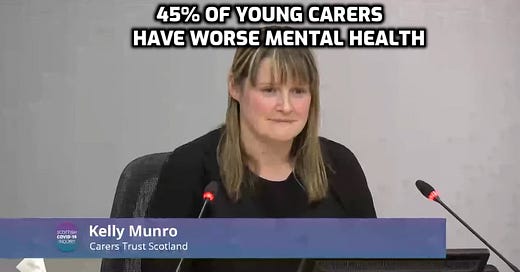Scottish COVID-19 Inquiry 12 Nov 2024
Testimony by Kelly Munro Education Officer for Carers Trust Scotland (CTS).
NB: The original video/audio broadcast quality was very poor.
Introduction
Kelly Munro is the Education Officer for Primary and Secondary Education for the charity Carers Trust Scotland (CTS). A lot of the work highlights young carers within education and the challenges that they face. Ms.Munro also delivers training to student and probationer teachers and has been working in her role with CTS since June 2019. Young carers range from 5yo-25yo.
Testimony highlights
Young carers stopped attending school weeks PRIOR to lockdown for fear of getting ‘the virus’ which was described described as having a ‘'chilling effect’’ on their attendance.
Young carers also struggled to remain healthy during lockdown.
Eat healthily
Exercise
Get enough sleep
‘‘35% of young carers were struggling to look after themselves.’’
‘‘Many lost their way in education and did NOT return.’’
Mental health
Young carers now have worse mental health due to ‘the pandemic’ restrictions.
Key findings of survey:
74% felt less connected to others.
69% under increased stress.
One young carer said:
‘‘It’s hard to care for someone when i can’t care for myself.’’
Statement highlights
‘‘All the reports of COVID-19 on the news made the young carers nervous.’’
-Paragraph 12 of statement
‘‘During the lockdown schools were closed. This meant that education was delivered online. Young carers really struggled with the closure of schools.’’
-Paragraph 16 of statement
‘‘Some young carers who were caring for people with a mental health condition or an addiction issue were denied attendance at hub schools by certain local authorities. They later told us that the believe that their education suffered in the longer term due to this and other impacts.’’
-Paragraph 23 of statement
‘‘Other challenges that young carers experienced included having to take buses to attend the pharmacy and then being refused entry because they were not the clinically vulnerable person. The young carer would be there to collect a prescription for the person they were caring for. Some young carers were being denied access to supermarkets. If they were at a supermarket with the cared for person, the young carer would on occasions be turned away as it was entry by one person only.’’
-Paragraph 46 of statement
‘‘It was highlighted that some young carers were on the phone to their carer service saying, "I'm so anxious", "I think I'm going tohave a breakdown", "I can't stay in the house anymore". This was particularly prevalent for young carers caring for someone who has drug and alcohol issues. On occasions these became child protection issues.’’
-Paragraph 48 of statement
‘‘45% of young carers who participated in the survey said that their mental health was worse than before the pandemic.’’
-Paragraph 55 of statement
‘'The impact of young carers not being in school was that many young carers were not referred to services Child and Adolescent Mental Health Services (CAMHS) and other mental health services for additional support.’’
-Paragraph 58 of statement
‘‘Some young people did not wish to go back to in-person learning. They were worried that they might catch COVID-19 and spread this to the person they care for.’’
-Paragraph 63 of statement
’’Some of the young carers were anxious after schools re-opened as other pupils did not wear masks….We learned that some wished to test all the time i.e., before and after school.’’
-Paragraph 64 of statement
‘‘Some young carers made the decision not to return to school even when they re-opened. It was not worth the risk for them….some young carers are still on part-time timetables.’’
-Paragraph 65 of statement
‘‘Some of our young people lost their way in education and did not return to school. The pandemic made it easy for the young people who were not attending to just slip out of the education system and leave…
..The impact of the pandemic is stil l prevalent now in young people. Young carer services have reported an increase in referrals since the pandemic in respect of mental health support for young carers.’’
-Paragraph 66 of statement
‘‘In one report CTS found that 35% of young carers were struggling to look after themselves during the pandemic. By this we mean being able to eat healthily, exercise, or get enough sleep. This rises to 59% amongst young adult carers.’’
-Paragraph 67 of statement
‘‘Based on anecdotal information, we would say that many young carers around three quarters of young carers were hesitant to go back to school.’’
-Paragraph 76 of statement
Carers Trust report July 2020
All for their health and safety.
Thoughts
Increased chronic stress. Difficulty eating healthy food, exercising, socialising, accessing healthcare services when combined would be a disaster for anyone’s health yet this was all done in the name of health.
‘‘The pandemic’’ = the biggest get out of jail free card ever!
Thanks for reading.
End
Links:
Full statement- https://www.covid19inquiry.scot/sites/default/files/ev-documents/sci-wt0221-000001.pdf
Video-Youtube- Scottish COVID-19 inquiry Impact hearing | Education and certification | 12 November 2024 (morning session)
Report- https://education.gov.scot/media/5tqdgloy/covid-19-research-briefing.pdf







Thanks for this - as you know I am a carer and activist myself, and I have reposted it here:
https://www.facebook.com/groups/1606150742949022
“The pandemic” = the biggest get out of jail card ever”. Isn’t it just, in the name “pandemic” they were given carte blanche to wreak havoc on societies. Pandemic/covid is being firmly established in our minds as an event that required extraordinary measures. If it can happen once and be accepted it can happen again.